Muhammad I. Qureshi
Log-Scale Quantization in Distributed First-Order Methods: Gradient-based Learning from Distributed Data
Jun 02, 2024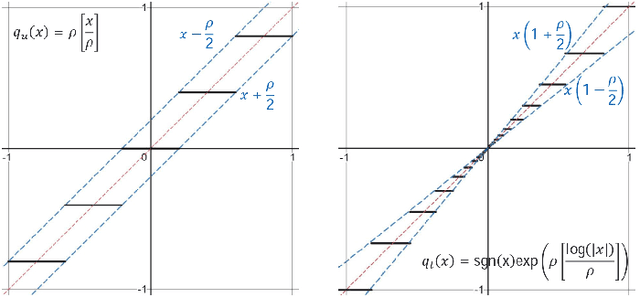
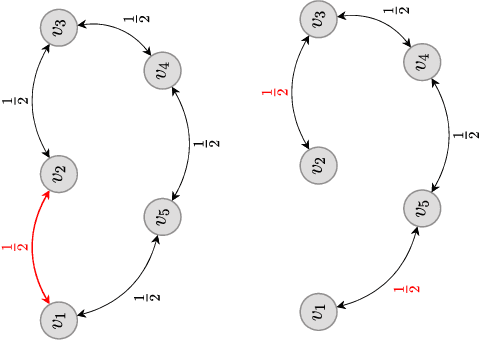
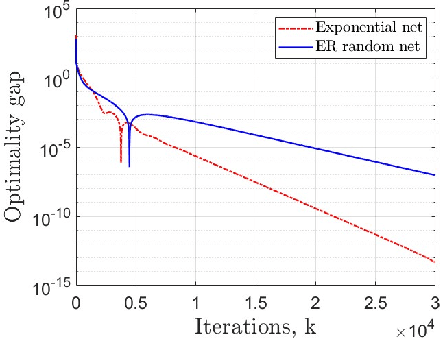
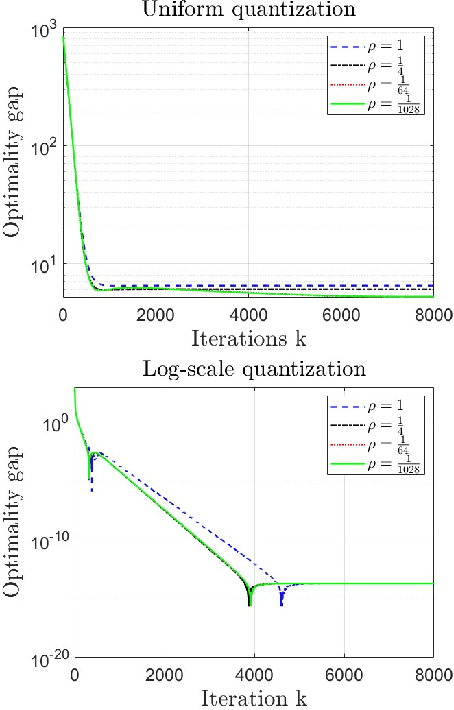
Abstract:Decentralized strategies are of interest for learning from large-scale data over networks. This paper studies learning over a network of geographically distributed nodes/agents subject to quantization. Each node possesses a private local cost function, collectively contributing to a global cost function, which the proposed methodology aims to minimize. In contrast to many existing literature, the information exchange among nodes is quantized. We adopt a first-order computationally-efficient distributed optimization algorithm (with no extra inner consensus loop) that leverages node-level gradient correction based on local data and network-level gradient aggregation only over nearby nodes. This method only requires balanced networks with no need for stochastic weight design. It can handle log-scale quantized data exchange over possibly time-varying and switching network setups. We analyze convergence over both structured networks (for example, training over data-centers) and ad-hoc multi-agent networks (for example, training over dynamic robotic networks). Through analysis and experimental validation, we show that (i) structured networks generally result in a smaller optimality gap, and (ii) logarithmic quantization leads to smaller optimality gap compared to uniform quantization.
Distributed saddle point problems for strongly concave-convex functions
Feb 11, 2022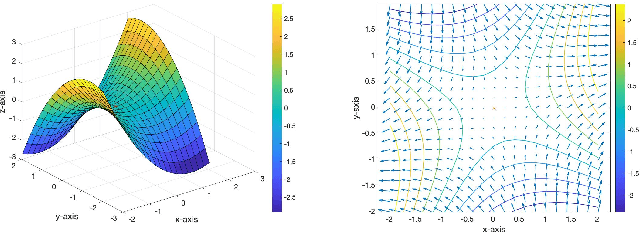
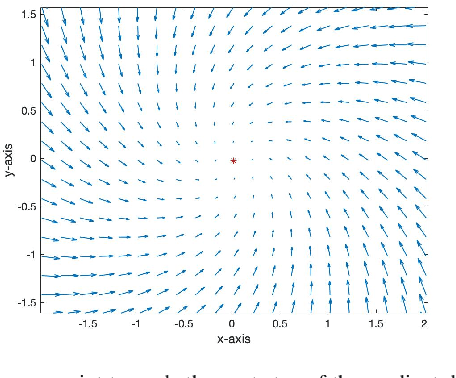

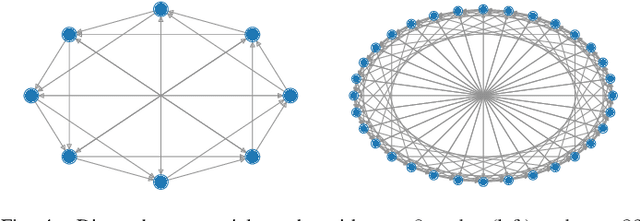
Abstract:In this paper, we propose GT-GDA, a distributed optimization method to solve saddle point problems of the form: $\min_{\mathbf{x}} \max_{\mathbf{y}} \{F(\mathbf{x},\mathbf{y}) :=G(\mathbf{x}) + \langle \mathbf{y}, \overline{P} \mathbf{x} \rangle - H(\mathbf{y})\}$, where the functions $G(\cdot)$, $H(\cdot)$, and the the coupling matrix $\overline{P}$ are distributed over a strongly connected network of nodes. GT-GDA is a first-order method that uses gradient tracking to eliminate the dissimilarity caused by heterogeneous data distribution among the nodes. In the most general form, GT-GDA includes a consensus over the local coupling matrices to achieve the optimal (unique) saddle point, however, at the expense of increased communication. To avoid this, we propose a more efficient variant GT-GDA-Lite that does not incur the additional communication and analyze its convergence in various scenarios. We show that GT-GDA converges linearly to the unique saddle point solution when $G(\cdot)$ is smooth and convex, $H(\cdot)$ is smooth and strongly convex, and the global coupling matrix $\overline{P}$ has full column rank. We further characterize the regime under which GT-GDA exhibits a network topology-independent convergence behavior. We next show the linear convergence of GT-GDA to an error around the unique saddle point, which goes to zero when the coupling cost ${\langle \mathbf y, \overline{P} \mathbf x \rangle}$ is common to all nodes, or when $G(\cdot)$ and $H(\cdot)$ are quadratic. Numerical experiments illustrate the convergence properties and importance of GT-GDA and GT-GDA-Lite for several applications.
Variance reduced stochastic optimization over directed graphs with row and column stochastic weights
Feb 07, 2022Abstract:This paper proposes AB-SAGA, a first-order distributed stochastic optimization method to minimize a finite-sum of smooth and strongly convex functions distributed over an arbitrary directed graph. AB-SAGA removes the uncertainty caused by the stochastic gradients using a node-level variance reduction and subsequently employs network-level gradient tracking to address the data dissimilarity across the nodes. Unlike existing methods that use the nonlinear push-sum correction to cancel the imbalance caused by the directed communication, the consensus updates in AB-SAGA are linear and uses both row and column stochastic weights. We show that for a constant step-size, AB-SAGA converges linearly to the global optimal. We quantify the directed nature of the underlying graph using an explicit directivity constant and characterize the regimes in which AB-SAGA achieves a linear speed-up over its centralized counterpart. Numerical experiments illustrate the convergence of AB-SAGA for strongly convex and nonconvex problems.
Push-SAGA: A decentralized stochastic algorithm with variance reduction over directed graphs
Aug 13, 2020



Abstract:In this paper, we propose Push-SAGA, a decentralized stochastic first-order method for finite-sum minimization over a directed network of nodes. Push-SAGA combines node-level variance reduction to remove the uncertainty caused by stochastic gradients, network-level gradient tracking to address the distributed nature of the data, and push-sum consensus to tackle the challenge of directed communication links. We show that Push-SAGA achieves linear convergence to the exact solution for smooth and strongly convex problems and is thus the first linearly-convergent stochastic algorithm over arbitrary strongly connected directed graphs. We also characterize the regimes in which Push-SAGA achieves a linear speed-up compared to its centralized counterpart and achieves a network-independent convergence rate. We illustrate the behavior and convergence properties of Push-SAGA with the help of numerical experiments on strongly convex and non-convex problems.
S-ADDOPT: Decentralized stochastic first-order optimization over directed graphs
May 15, 2020



Abstract:In this report, we study decentralized stochastic optimization to minimize a sum of smooth and strongly convex cost functions when the functions are distributed over a directed network of nodes. In contrast to the existing work, we use gradient tracking to improve certain aspects of the resulting algorithm. In particular, we propose the S-ADDOPT algorithm that assumes a stochastic first-order oracle at each node and show that for a constant step-size $\alpha$, each node converges linearly inside an error ball around the optimal solution, the size of which is controlled by $\alpha$. For decaying step-sizes $\mathcal{O}(1/k)$, we show that S-ADDOPT reaches the exact solution sublinearly at $\mathcal{O}(1/k)$ and its convergence is asymptotically network-independent. Thus the asymptotic behavior of S-ADDOPT is comparable to the centralized stochastic gradient descent. Numerical experiments over both strongly convex and non-convex problems illustrate the convergence behavior and the performance comparison of the proposed algorithm.
 Add to Chrome
Add to Chrome Add to Firefox
Add to Firefox Add to Edge
Add to Edge